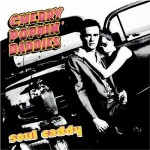 Cherry Poppin’ Daddies
Cherry Poppin’ Daddies
Soul Caddy
Mojo/Jive
Poor Steve Perry is misunderstood by the press. Lead singer and raison ‘d’etre for the Eugene-based Cherry Poppin’ Daddies, he has been pegged in some quarters as a “hep cat Swing dude,” in the usual effort to manufacture, pigeon-hole and destroy its Pop stars. Most of these naysayers are familiar with the Daddies only as far back as their 1997 hit release Zoot Suit Riot. and the song of the same name.
The trend riding success of that album threw the Daddies into the national spotlight after more than a decade of hard work at the local and regional levels. Though Zoot Suit Riot was actually their fourth album and, in reality, a sort of greatest hits package at that, many among the press pronounced the band a one trick pony: along with Swing revivalists such as Royal Crown Revue, Squirrel Nut Zippers and Big Bad Voodoo Daddy.
Because of Poor Steve’s penchant for espousing the Lounge-drenched philosophy of ratpacker Sammy Davis Jr., as well as that of the consummate Cocktail alter-ego, Buddy Love (from Jerry Lewis’ The Nutty Professor), lazy journalists often mistake the œurvre of Daddies’ brass infused musings as some sort Cab Calloway tribute. Anyone familiar with Perry’s life and music know the guy is truly a Rocker, in the pure, existential sense of the term.
And anyone party to the incomprehensibly strange Perry stage shows of the early ‘90s probably has a difficult time recognizing Poor Steve in his guise as dapper Swing maven. Back in the old days one was more likely to catch him in a near naked state, pretending to be a penis.
The new album, Soul Caddy, gives a good indication of the rich tradition of musical diversity that Perry and the Daddies have truly always upheld; delivering a baker’s dozen of stylistically wide-ranging numbers— transforming from Swing to Ska/Reggae, from moody introspective acoustic music, or traditional Vegas Lounge ballads to Punky Rock with chameleon-like ease.
Fore those comfortable with the Daddies as a Big Band Swing unit, cuts such as the clever “Swinging With Tiger Woods,” “So Long Toots” and Bob Willsish “Uncle Ray” should satisfy the jones. But those seeking the true Daddies’ headwaters should look to the Metal/Ska of “God Is A Spider,” the Specials/Joe Jackson/English Beat tinged Ska/Reggae of “Stay Don’t Just Stay,” or “You’re My mistake” and “End Of The Night.”
And to fully grasp the complex elements which comprise the soul of Perry and the Daddies, one should pay close attention to the lead track, “Diamond Light Boogie.” Here we observe influences such as Bowie, T-Rex and Adam Ant. Or descry the shoe-gazing splendor of the acoustic guitar colors of “Grand Mal,” comparable to those of E and the Eels. Jason Moss’ well-placed guitar punctuations add further texture to the proceedings.
The title track combines elements of some of the classic Soul purveyors, such as Otis Redding and Sam Cooke, along with an English feel comparable to that of Madness. “Irish Whiskey” is a hard rocking number which incorporates the essential Punk/Pop components of bands such as Bad Religion and Offspring. Truly wondrous.
“Bleeding Ceremony” begins with acoustic guitar and tweeky synth injections from keyboardist Dustin Lanker, before exploding into an Aerosmith-like strut, accentuated by Moss’ chunky lead guitar.
Finally, “Saddest Thing,” in its stalwart impeccability, could be the work of Johnny Mercer and Jimmy Van Heusen— a prototypical Las Vegas cocktail lounge torch song— tailor-made for Billie Holiday, over forty years after her demise. Perry’s vocal is spectacular in it’s Holiday-like phrasing, as is the brilliant sax work of alto man Ian Early.
It would be a terrible mistake to simply write off Steve Perry and the Cherry Poppin’ Daddies as the distributors of yet another discarded musical fad. Though the band have always had Swing leanings, that style was never the sole milieu.
Soul Caddy, the band’s first real album in nearly five years, forthrightly illustrates that the Daddies are hardly flash-in-the-pan stylistic ambulance chasers. Perry’s growth as a songwriter (one could quibble that his singing, oftentimes void of the leering swagger found in his Swing compositions, does not always display the same level of maturity) is obvious and distinct.
If anything, the band is pointing the way toward another stylistic trend on the horizon: Pop/Ska/Punk, álá Madness meets Bad Religion. The style is not without its precedents. If No Doubt can do it, why not the Daddies?
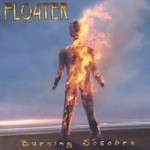 Floater
Floater
Burning Sosobra
Elemental Records
It’s a shame there aren’t awards given locally for such categories as “Best Album” cover. If there were such an award, this year it would most certainly go to the trio from Eugene for their album Burning Sosobra. Colorful and magnificently staged, the well-photographed image of a burning plaster man set against a purple-orange seaside sunset perfectly conveys the tensions contained in the music within the package.
Having released albums approximately every two years for the past six years, Floater approach their fourth recording with a mature assuredness that can only come from endless rehearsals and performances, honing their material to razor sharpness. Their musical turf is now clearly defined and the band stalks like a pack of wolves the perimeters of that territory.
With the imagery of Jim Morrison, the naked emotion of Afghan Whigs and U2, the musicianship of the Police, Rush, Stone Temple Pilots and Zeppelin, Floater contrast and combine subtle musical textures to introspective, emotionally charged lyrics. Vocalist, bassist Rob Wynia, infuses every Floater song with a sense of personal drama and poetic depth in an highly unique way.
Floater still occasionally indulge their predilection for odd sound bites and curious samples, but here, moreso than ever before, it is better integrated into the flow of the material. Drummer Pete Cornett’s exotic percussion loops often set the mood for a given song. Dave Amador’s muscular guitar work echoes that of Rick McCollum of the Whigs in its orchestral aspects.
Nearly every song is a standout, cleverly conceived and masterfully executed. Each member of the band endows the entire production with intricate and indelible sonic architectures in support of somewhat complex lyrical arrangements.
Most of the fourteen songs seem to adopt a common mythology, based upon a sort of pantheistic animism. “Here Comes The Dog” “Watched Over By Crows,” “Queen Of The Goats,” “King Rabbit,” “Milk Of Heaven” “Albatross,” “The Marriage Of The Black Sheep” “Colorblind” the cover of the Doors’ “Waiting For The Sun” and “Equinox” all maintain a certain thematic synergism.
“Watched Over By Crows” exhibits a graceful poetry over a hardhitting 12/8 time signature. “Exiled” plays with similar Bach-like rhythmic and harmonic structures. “Queen Of The Goats” maintains more of an Eastern motif, driven by Cornett’s polyrhythmic pounding and Amador’s thundering guitar machinations, over which Wynia operatically ululates.
“Independence Day” offers a change of pace. Over hopping upstroke guitars, Cornett offers a syncopated salvo lending a Reggae feel to the song, as if the early Police were backing U2’s Bono Hewson. Similarly, “Milk Of Heaven” has a U2 flavor and shines from Amador’s thrilling guitar pyrotechnics.
The sample in the intro of “Albatross” appears to be the recitation of a poem by a young boy. It carries a very dense specific gravity. The song that follows rides a smart beat, with strutting bass and guitar— and vocal lines that reflect myriad influences, including even Roger Daltry from the Who’s Next period.
Along the same line, Floater’s cover of the Doors’ “Waiting For The Sun” is faithful to the original, though mightily beefed up in the guitar department by Amador. “The Marriage Of The Black Sheep” never quite cuts loose, though Wynia intimates rancor and rage at intervals and turns. The rest of the time, he sings as if there were a radiator inside him that, overheating, was set to burst. Somewhat, analogous to Trent Reznor’s thermostat.
Taking a different tack, “Colorblind” is a reflective piece, acoustic guitars against restrained drums. Wynia’s protagonist in “Alcoholic” is more to the point, though he does not deal with the issue head on, adopting instead a more philosophical approach to the problem.
In fact if there is to be a complaint about Floater poetry, it’s that it is dominated by third-person tales about Goat Queens and Rabbit Kings, which may have some unknown esoteric context, but in light of public taste, would seem a bit ponderous for general consumption, a bit like Prog Rock bands of the early ‘70s— Gentle Giant, Jethro Tull, Genesis, Yes, etc.
But for that, this is a very solid album from a well-drilled band, Their chops are not in question, nor their artistry, their intelligence nor their integrity, but were their lyrics as direct as the cover to their album, we would be considering an award for the band rather than for the graphic artist.
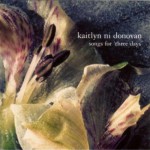 Kaitlyn Ni Donovan
Kaitlyn Ni Donovan
“Ceiling Tiles (2000)”
Self-Produced
A little over a year ago, Kait released her brilliant album Songs For Three Days which contained the original version of “Ceiling Tiles.” Kait and producer extraordinaire Tony Lash elected to re-release the song with a new mix (including new, or different, instrumentation) giving everyone the opportunity to appreciate Kait all over again. She is an unfamiliar treasure to this city and a complete secret to the rest of the world. This is a tragic shame.
Our review of Songs For Three Days compared Kait and Tony’s production to Radiohead’s work on OK Computer . That comparison would seem even more appropriate, given Radiohead’s subsequent release, the stunning Kid—A. Utilizing the previous haunting Fender Rhodes keyboard line from the original track, Lash layers further keyboard enhancements via a variety of synths, over a sparse drum loop.
Kaitlyn’s angelic vocal hovers above, glancing and dancing like moonlight on an evening lake, calling to mind Kate Bush; as Eric Furlong’s bouyant bass provides the impetus. A wondrous brief string section appears and recedes at the mid-point. Synth string pads breathe luxuriously beneath, as other keyboards whir and purr on the periphery.
In a kinder world, Kaitlyn Ni Donovan would have already achieved the widespread recognition she so richly deserves. Her mysterious songs have a Bronte-like quality that calls forth images of foggy dells, windswept moors and starcrossed lovers. Very few musicians have such keen powers of evocation. Those availed of such talents are rare enough indeed, and should be cherished for their uncommon gifts. Kaitlyn Ni Donovan and Tony Lash are among those artists.
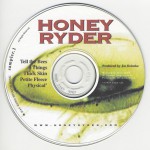 Honey Ryder
Honey Ryder
Honey Ryder
Self Produced
Here’s a fine new band to the scene, named after one of the bombshell characters in Ian Fleming’s James Bond series. The band is fronted by Cristen Chambers, a dusky-voiced focal point comparable to No Doubt’s Gwen Stefani with a little Courtney Love thrown in for good measure. The band, guitarists Heidi Spring and Van Chai and the rhythm section of guests Michael Nelson on drums and Robert Thorton from Barbarella on bass, play edgy, high-energy Rock with panache and aplomb.
The five songs presented on this EP brim with vigor and vitality. Producer Joe Reineke from the band Alien Crime Syndicate, digs deep into his bag of tricks, affording the band a tough, aggressive sound. Chambers’ often heavily effected vocals are given a menacing characteristic, which blends well with Spring and Chai’s tough, smart guitar onslaught.
One of the guitars on “Tell The Bees” hums maddeningly, while the other guitar merrily chunks along in a riff that calls to mind the Breeders. Chambers’ double-tracked vocal helps to maintain an off-handed Chrissie Hynde-like cynicism. A perky anthem. “4 Things” twists on a stiletto sharp guitar riff, the effect of which could pass as a revved-up remake of Missing Persons’ ‘80s nugget “Walking In LA.” Very hot!
“Thick Skin” sounds like Love, though more brawny than Hole. “Petite Fleece” veers closer to the work of the Divinyls, Chambers’ vocal in the choruses breaking in a way similar to Christine Amphlett, like Debbie Iyall of Romeo Void at other times. Finally, the band’s version of Adam Ant’s “Physical” is slow and sensual, adding a completely new dimension to the song.
Cristen Chambers has a distinctive voice, sort of Nancy Sinatra for the new millennium. She’s backed here by a solid band. The material. while not bad, is a bit innocuous and at times fails to fully challenge Chambers to push herself vocally. It might be fun to hear her lose her cool once in a while.
But apart from that, Honey Ryder are not without considerable charm, which should translate well to the live stage. Here is a band that shows a lot of promise, delivering compact, concise retro Rock of the ‘80s persuasion, with unabashed authority.
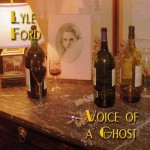 Lyle Ford
Lyle Ford
Voice Of A Ghost
Self Produced
This is Ford’ second release in the Portland market. A few of the songs found here appeared on his first release in 1996. The premise of this album is somewhat unique. It was recorded completely live in the studio, in one take with no overdubs. Two sessions and this eleven song project was finished. Lyle’s voice and songwriting are so strong that not a lot of embellishment is necessary to put him over upon the listener.
His talent too is a well-kept secret in this town— which is an outright shame, because he is easily the equal of any other singer/songwriter in the area. To ignore him cheats not only Lyle, but a lot of potential listeners as well, which would be a double shame.
Vested of a sonorous voice and craftsmanlike songwriting skills, his style would seem so fall somewhere between Folk and Country. His songs speak to issues generally experienced by mature adults: hardscrabble homilies, with the barest of imagery, the scantest of adjectives. The underappreciated Country singer Larry Gatlin comes to mind in possible comparison, as does Bruce Cockburn.
Supporting him in this unusual “live” endeavor, are ubiquitous sideman Tim Ellis, who has played guitar, or participated in some capacity on literally hundreds of recordings; Kevin Rankin, whose most notable recent gig was as the drummer for Lea Kreuger in On A Llama; and bassist Jeannine Dawson, formerly of Finn, the Vultures and the Voodoo Dolls, among several.
Of the eleven songs presented, ten are Ford-penned, the other is a cover of a Paul Stookey (from Peter, Paul & Mary) song, “A Soulin’.” “Clear Night In June” is a simply stated ballad, wherein Ellis tosses in a few fills at the turns and Rankin lays down a gentle beat. The addition of hints of Debussy’s “Clair De Lune” at the very end is a nice touch, in reference to a line in the song.
“In My Bones,” just Lyle and his guitar, is a tender ballad with a pretty chorus. “Broken Hearts,” featuring the whole band, would sound great in KINK’s format. “Goodbye My Heart” highlights Lyle’s fluid voice with a little yodel in the melody of the verse. “Hall Of Mirrors” stands out as well.
Perhaps the most successful song is “Go There With Me.” A solid chorus and standout performances from the entire ensemble help to elevate it above the others. “Just A Thing” breaks free of the emotional doldrums with a jaunty melody that hearkens to Small Faces’ “Itchycoo Park.” Lyle’s cover of “A Soulin’” is faithful to the original which ran along the lines of “Scarborough Fair” and “God Rest Ye Gentleman.”
Though they are pleasant enough, Lyle Ford’s melodies sometimes fail to go anywhere, they spin around, never arriving at a satisfying chorus. On the occasions (such as with “Go There With Me”) that Lyle puts it all together, he proves that he is more than merely competent as a songwriter. He can be very good.
